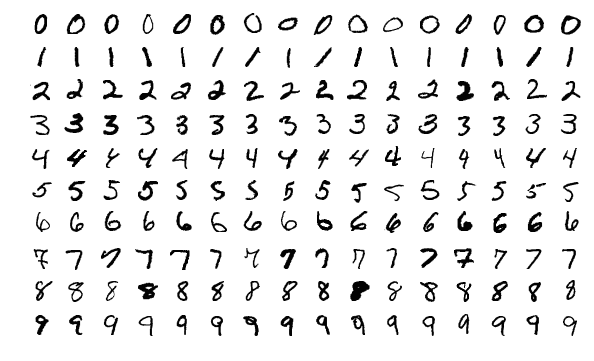MNIST with TensorFlow
Contents
MNIST with TensorFlow#
The following code example is mainly based on Mikhail Klassen’s article Tensorflow vs. PyTorch by example
MNIST#
The MNIST database (Modified National Institute of Standards and Technology database) is a large database of handwritten digits that is commonly used for training various image processing systems.

Image source: Wikipedia, Josef Steppan
Setup#
import tensorflow as tf
import tensorflow_datasets as tfds
import numpy as np
Define settings#
# Random seed for reproducibility
seed = 42
tf.keras.utils.set_random_seed(seed)
# Save the model at the end?
save_model = False
# Batch sizes for training and testing
batch_size = 64
test_batch_size = 14
# Training epochs (usually 10 is a good value)
n_epochs = 2
# Learning rate
learning_rate = 1.0
# Decay rate for adjusting the learning rate
gamma = 0.7
# Number of target classes in the MNIST data
num_classes = 10
# Data input shape
input_shape = (28, 28, 1)
Data preparation#
# Load the MNIST dataset
mnist = tf.keras.datasets.mnist
(x_train, y_train), (x_test, y_test) = mnist.load_data()
# The scaled mean and standard deviation of the MNIST dataset (precalculated)
data_mean = 0.1307
data_std = 0.3081
# Reshape the input data
x_train = x_train.reshape(x_train.shape[0],
x_train.shape[1],
x_train.shape[2], 1)
x_test = x_test.reshape(x_test.shape[0],
x_test.shape[1],
x_test.shape[2], 1)
# Normalize the data
x_train = (x_train/255.0 - data_mean) / data_std
x_test = (x_test/255.0 - data_mean) / data_std
# Convert labels to one-hot vectors
y_train = tf.one_hot(y_train.astype(np.int32), depth=num_classes)
y_test = tf.one_hot(y_test.astype(np.int32), depth=num_classes)
Model architecture#
# Define the architecture of the neural network
model = tf.keras.models.Sequential([
tf.keras.layers.Conv2D(32, (3,3), strides=(1,1),
padding='valid',
activation='relu',
input_shape=input_shape),
tf.keras.layers.Conv2D(64, (3,3), strides=(1,1),
padding='valid',
activation='relu'),
tf.keras.layers.MaxPool2D(),
tf.keras.layers.Dropout(0.25),
tf.keras.layers.Flatten(),
tf.keras.layers.Dense(128, activation='relu'),
tf.keras.layers.Dropout(0.5),
tf.keras.layers.Dense(num_classes, activation='softmax')
])
Model training#
# Decay the learning rate at a base rate of gamma roughly every epoch, which
# is len(x_train) steps
scheduler = tf.keras.optimizers.schedules.ExponentialDecay(
learning_rate,
decay_steps=len(x_train),
decay_rate=gamma)
# Define the optimizer to user for gradient descent
optimizer = tf.keras.optimizers.Adadelta(scheduler)
# Compile the model
model.compile(optimizer=optimizer, loss='categorical_crossentropy', metrics=['acc'])
# Display a model summary
model.summary()
Model: "sequential_1"
_________________________________________________________________
Layer (type) Output Shape Param #
=================================================================
conv2d_2 (Conv2D) (None, 26, 26, 32) 320
conv2d_3 (Conv2D) (None, 24, 24, 64) 18496
max_pooling2d_1 (MaxPooling (None, 12, 12, 64) 0
2D)
dropout_2 (Dropout) (None, 12, 12, 64) 0
flatten_1 (Flatten) (None, 9216) 0
dense_2 (Dense) (None, 128) 1179776
dropout_3 (Dropout) (None, 128) 0
dense_3 (Dense) (None, 10) 1290
=================================================================
Total params: 1,199,882
Trainable params: 1,199,882
Non-trainable params: 0
_________________________________________________________________
# Train the model
model.fit(x_train, y_train,
batch_size=batch_size,
epochs=n_epochs,
validation_data=(x_test, y_test),
validation_batch_size=test_batch_size)
Epoch 1/2
938/938 [==============================] - 141s 149ms/step - loss: 0.1881 - acc: 0.9423 - val_loss: 0.0512 - val_acc: 0.9826
Epoch 2/2
938/938 [==============================] - 136s 145ms/step - loss: 0.0704 - acc: 0.9794 - val_loss: 0.0384 - val_acc: 0.9881
<keras.callbacks.History at 0x7fe1dff04940>
if save_model:
model.save_weights("mnist_cnn_tf.ckpt")

